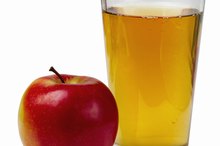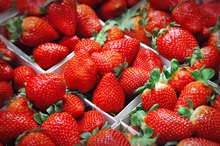Herbs to Dissolve Uric Acid
Acidic diets rich in purines, which are commonly found in organ meats, aged cheese, shellfish, mushrooms and wine, promote the formation and precipitation of uric acid crystals. Uric acid crystals can collect in the kidneys to form stones, or they can become deposited within joints and cause a painful, arthritic-like condition called gout. Uric acid crystals are sharp and cause pain and inflammation in surrounding tissues. Some herbs are effective at dissolving and removing uric acid crystals from the body.
Fresh Lemon Juice
Drinking fresh lemon juice can prevent gout attacks or reduce the inflammatory reaction by stimulating the formation of calcium carbonate within the body, as cited in “Biochemical, Physiological and Molecular Aspects of Human Nutrition." Calcium carbonate neutralizes acids within the blood, including excess uric acid that lead to gout attacks in joints such as the big toe. Fresh lemon juice is also an excellent source of vitamin C, which strengthens the connective tissues around joints and minimizes damage done by the sharp uric acid crystals. Further, the citric acid within lemon act as a solvent for the crystals and dissolves them, lowering serum uric acid levels.
- Drinking fresh lemon juice can prevent gout attacks or reduce the inflammatory reaction by stimulating the formation of calcium carbonate within the body, as cited in “Biochemical, Physiological and Molecular Aspects of Human Nutrition."
- Fresh lemon juice is also an excellent source of vitamin C, which strengthens the connective tissues around joints and minimizes damage done by the sharp uric acid crystals.
Burdock Root
Does Apple Juice Prevent Gout?
Learn More
Burdock root is a prominent traditional herbal remedy for a variety of arthritis types, including acute gout attacks. Due to burdock roots abilities to clean the bloodstream of toxins, reduce inflammation and promote the excretion of urine, which contains uric acid, it is considered an effective folk remedy for gout, according to “The Essential Book of Herbal Medicine." A common recommended dosage is 20 to 30 drops of burdock root tincture mixed in 8 oz. of water, three to four times a day for a few days.
- Burdock root is a prominent traditional herbal remedy for a variety of arthritis types, including acute gout attacks.
- A common recommended dosage is 20 to 30 drops of burdock root tincture mixed in 8 oz.
Devil's Claw
Devil’s claw is a natural anti-inflammatory commonly used to treat the symptoms of various types of arthritis, including gout. Devil’s claw is able to dissolve and reduce the levels of uric acid within the bloodstream. A common recommended dosage of Devil’s claw is 500 to 750 mg, three times daily, while suffering from an acute gout attack.
Alfalfa Sprouts
Herbs for Improving Kidney Function
Learn More
Alfalfa is not only a rich source of numerous vitamins and minerals, but it also reduces serum uric acid levels. Further, alfalfa has a powerful alkalizing affect within the body, raising pH levels and dissolving uric acid crystals, which is an effective way of preventing gout attacks, as cited in “Medical Herbalism." In general, uric acid stays dissolved in alkaline, or basic, fluids within the body.
Sour Black Cherries
Fresh black cherries and cherry juice concentrate are popular remedies for gout and kidney stones made from uric acid. Black cherries lower serum levels of uric acid and contribute to dissolving the precipitated crystals within gouty joints and kidney stones, according to “Biochemistry of Human Nutrition." Sour cherries also have an alkalizing effect on the blood and tissues, similar to alfalfa and lemon juice. Further, most cherries contain an enzyme that neutralizes uric acid and most are high in anthocyanins, which are strong antioxidants and anti-inflammatories, as cited in “Advanced Nutrition: Macronutrients, Micronutrients and Metabolism." The amount of cherries usually recommended to control a gout attack is between 1/2 dozen and 2 dozen daily.
- Fresh black cherries and cherry juice concentrate are popular remedies for gout and kidney stones made from uric acid.
- Black cherries lower serum levels of uric acid and contribute to dissolving the precipitated crystals within gouty joints and kidney stones, according to “Biochemistry of Human Nutrition."
Related Articles
References
- “Biochemical, Physiological and Molecular Aspects of Human Nutrition”; Martha Stipanuk; 2006
- “The Essential Book of Herbal Medicine”; Simon Mills; 1994
- “Medical Herbalism: The Science Principles and Practices of Herbal Medicine”; David Hoffmann; 2003
- “Biochemistry of Human Nutrition”; George Gropper; 2000
- “Advanced Nutrition: Macronutrients, Micronutrients, and Metabolism”; Carolyn D. Berdanier; 2009
- George C, Minter DA. Hyperuricemia. [Updated 2019 Jun 4]. In: StatPearls [Internet]. Treasure Island (FL): StatPearls Publishing; 2019 Jan-.
- American Association for Clinical Chemistry. Uric acid. Reviewed May 17, 2017.
- Benn CL, Dua P, Gurrell R, et al. Physiology of hyperuricemia and urate-lowering treatments. Front Med (Lausanne). 2018;5:160. doi:10.3389/fmed.2018.00160
- George C, Minter DA. Hyperuricemia. [Updated 2019 Jun 4]. In: StatPearls [Internet]. Treasure Island (FL): StatPearls Publishing; 2019 Jan-.
- Ramirez-Sandoval JC, Madero M. Treatment of hyperuricemia in chronic kidney disease. Contrib Nephrol. 2018;192:135-146. doi: 10.1159/000484288
- Wilson FP, Berns JS. Tumor lysis syndrome: new challenges and recent advances. Adv Chronic Kidney Dis. 2014;21(1):18–26. doi:10.1053/j.ackd.2013.07.001
- American Association for Clinical Chemistry. Uric acid. Reviewed May 17, 2017.
- Khanna D, Fitzgerald JD, Khanna PP, et al. 2012 American College of Rheumatology guidelines for management of gout. Part 1: systematic nonpharmacologic and pharmacologic therapeutic approaches to hyperuricemia. Arthritis Care Res (Hoboken). 2012;64:1431–46. doi: 10.1002/acr.21772
- Coburn BW, Bendlin KA, Sayles H, et al. Target serum urate: Do gout patients know their goal? Arthritis Care Res (Hoboken). 2016;68(7):1028-35. doi:10.1002/acr.22785
- Wiederkehr MR, Moe OW. Uric acid nephrolithiasis: a systemic metabolic disorder. Clin Rev Bone Miner Metab. 2011;9(3-4):207–217. doi:10.1007/s12018-011-9106-6
Writer Bio
Owen Bond began writing professionally in 1997. Bond wrote and published a monthly nutritional newsletter for six years while working in Brisbane, Australia as an accredited nutritionalist. Some of his articles were published in the "Brisbane Courier-Mail" newspaper. He received a Master of Science in nutrition from the University of Saskatchewan.









